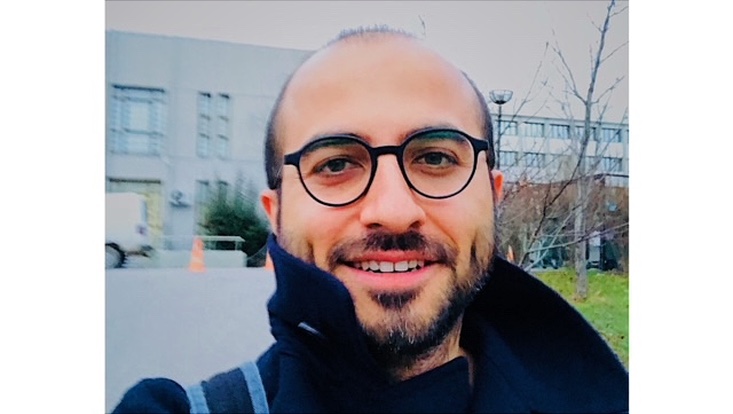"Only few locations can beat the perfect place of Alsterterrasse!"
14. Mai 2021

Foto: Atmacasoy
An interview with visiting scholar Abdullah Atmacasoy
Abdullah Atmacasoy ist Doktorand an der Middle East Technical University (METU) in Ankara und im Rahmen der Arbeitsgruppe DivER (Diversity in Education Research) seit Oktober 2020 als Gastwissenschaftler und DAAD-Stipendiat an der Fakultät für Erziehungswissenschaft. Wir haben Herrn Atmacasoy einige Fragen gestellt, um seine Eindrücke aus Hamburg einzufangen.
Faculty of Education: Mr. Atmacasoy, thank you very much for taking the time to answer a few questions today. To warm up: What was your first impression of the city of Hamburg?
Atmacasoy: As I had earlier visited Hamburg at the very beginning of my research and spent a whole perfect summer here, I feel lucky to have experienced the city before the pandemic. When I am in Hamburg, I feel like living in a big city but with lots of green spaces and convenient lifestyle that is quite rare in cities with similar size.
You continued working on your thesis here in Hamburg. Could you briefly introduce your research topic and question to us?
In my research, I investigate the bridging language programs for newly arrived migrant students in monolingual countries, namely in İstanbul and Hamburg. The aim is to reveal what structural factors predict the students’ destination language proficiency because it’s a gatekeeper skill, particularly in monolingual education settings, that either facilitates or hampers the students’ educational trajectories. In the qualitative phase of my research, I conducted observations and interviews with students, their parents, school managers, teachers and key stakeholders. On top of these qualitative findings, I have developed a questionnaire and language tests in Turkish/German to understand the relationship between structural factors and the degree of students’ destination language proficiency.
You have worked as a teacher for 10 years and have gained a lot of experience in teaching practice. How did these experiences help you in your scientific research?
Right, after completing my bachelor’s degree in English Language and Literature, I started working in an English foundation program at a state university in Turkey. When I started teaching, I was 23 years old and had few clues about my aspirations and my career trajectory. The more I gained experience in teaching, the more I became interested in the root causes of issues in my classrooms and in the institution, particularly instructional strategies in low-resource contexts. I think I always reap the benefits of coming from practice. For instance, I know that it is almost impossible to realize well-established curricula or teaching strategies without solving structural barriers in an institution. I may also have some insights about the feasible and infeasible aspects of an implementation at the outset of projects. However, I think the most important skill I have gained as a teacher is to be target-oriented and strive for solving problems in a relatively short time.
How did your stay in Hamburg at our Faculty contribute to your research? What scientific experiences did you gain and what support did you get?
During my stay in Hamburg, I feel very comfortable reaching out to my colleagues for support and guidance. In the faculty and particularly in DivER, I share a common research area with some colleagues with whom we have the opportunity to discuss our ongoing research and share our experiences.
Due to school closures and distance learning, I have had to revise the quantitative phase of my research because it was originally planned to explore students’ language learning in face-to-face classroom settings. As it is a new phenomenon for all, I needed to consult experienced researchers about my revised plan and how I can capture the current situation at its best. I received significant feedback from my supervisor, Prof. Gogolin, and some colleagues including Dr. Katherina Ackermann while adapting my data collection instruments to the pandemic conditions.
Being involved in Prof. Gogolin’s doctoral colloquium group, I regularly meet with like-minded people to share the progress and obstacles in our research. In a time when in-person meetings are restricted, this is an important opportunity and avenue to exchange experiences.
I am also giving a seminar course on qualitative research methods this semester at the Faculty of Education, which is a completely new and rewarding experience for me.
How did working at the Faculty of Education in Hamburg differ from your work at METU in Ankara?
In contrast to the individual doctorate at the University of Hamburg, I am a PhD candidate in a structured program in Curriculum and Instruction at METU. It means that I had to go through an intensive and rigorous coursework and pass a comprehensive doctoral qualification exam. For most students including me, the period I have prepared for this exam was one of the most stressful times of my life.
One of the major differences and probably the most prominent drawback of a structured doctoral program is the research environment in which your supervisor and thesis examination committee become the only group of people with whom you can discuss your progress and challenges. Conducting a comparative study with two supervisors has enabled me to benefit from the advantages of both institutions. Now, I have the opportunity to interact with researchers working on different projects in my research area in DivER and at the Faculty of Education.
The reason I chose to conduct the German phase of my research in Hamburg is the expertise of the research group here and particularly Prof. Gogolin’s prominent stance in the field of language and migration. Besides, Hamburg was one of the few cities in Germany that can be compared to İstanbul in terms of its demography and migration-specific indicator
Finally, please name one thing that you will continue to associate with your stay in Hamburg in the Future.
Few locations can beat the perfect place of Alsterterrasse!
Thank you very much for your time! We wish you good luck with the finalization of your thesis.


